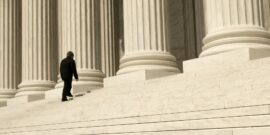Congress versus the Courts: Official Immunity and the Dormant Commerce Clause
One of the issues involved in the dispute concerning the Dormant Commerce Clause is whether the action is taken by the courts or the Congress. Defenders of the Dormant Commerce Clause argue that the courts will do a better job of protecting against state protectionism than would Congress.
There are, of course, other areas where the court versus Congress question arises. Bill Levin, who has posted on this blog in the past, discusses the issue relating to immunities for congressional officials:
Comments made in Congress are protected by constitutional “speech or debate” immunity. Federal officials operating within the scope of their duties have been granted official immunity, first for judges, then extended broadly to almost all federal executive officials, including prosecutors. Surprisingly the courts for almost two hundred years had no occasion to decide whether official immunity extended to members of Congress.
In 1987, a case of first impression reached the D.C. Circuit in which a legal services lawyer in Tennessee accused Republican Congressman Don Sundquist of defamation in letters distributed to the media. The lower court dismissed the action, but the D.C. Circuit reversed by a 2-1 vote. As fate would have it, the majority decision in Chastain v. Sundquist was written by former Senator James Buckley and the dissent by former Congressman Abner Mikva.
The decision held that members of Congress are liable for common law tort actions even when acting within the scope of their official duties, distinguishing the case for absolute immunity on two grounds. First, the grant of “speech or debate” immunity was shown in the historical record to be explicitly premised in English law on a well-known exposure to any and all statements made on the hustings. It was understood as part of the received legal background that government representatives properly stood before the law as a citizen when operating outside the sacrosanct boundaries of Parliament, or later the Congress. Speech or Debate immunity went hand in hand with exposure to common law torts. Additionally, it was noted that members of Congress, unlike other federal officials, uniquely could seek to immunize themselves by statute.
The House of Representatives unanimously petitioned the Supreme Court to grant certiorari, which was denied. And so matters stood, until in the following year Congress enacted the so-called Westfall legislation, which was drafted in response to a Supreme Court decision limiting official immunity to discretionary acts. The Chastain decision gave Congress significantly greater impetus to confer absolute immunity on themselves by statute.
As Bill (who was a law clerk to Judge Buckley at the time) indicates, the Chastain case certainly shows that courts need not act, and that the Congress can do so.
But the Chastain case, and the general issue of congressional, executive, and judicial immunity, also raise the question as to which entity — Congress or the courts — is the better one for addressing these matters. I am not sure that defenders of the Dormant Commerce Clause can rely on the immunity issue as one where the courts performed better than the Congress. In the early years of the republic, executive officers were generally liable for illegal acts and their illegal acts occasioned compensation to their victims. There was no qualified immunity. But the courts then stepped in and invented common law to protect government officials (Chastain being a notable exception). The policy basis of these decisions was intended to protect big government. Without this immunity, it was thought that officials would be too cautious for fear of liability.
Of course, I am not sure that Congress always makes the right decision either. Perhaps Members of Congress should face common law liability. But the basic point is that it is by no means clear that the courts are more likely to get the right answer.

